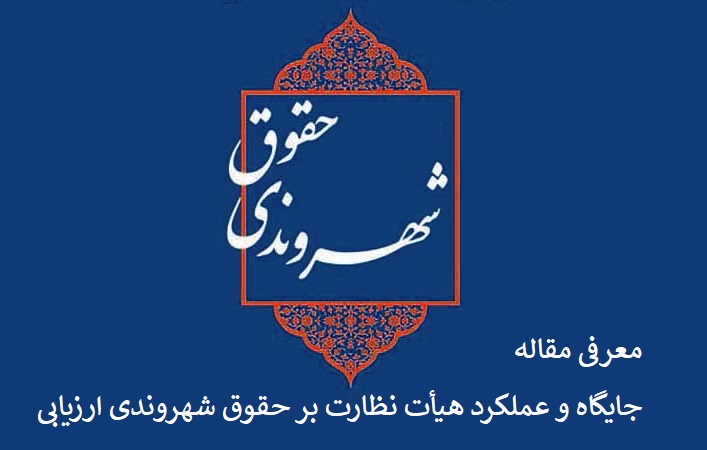
نوع مقاله : علمی-پژوهشی
نویسندگان
سید محمد مهدی غمامی: دانشیار، گروه حقوق عمومی، دانشکدۀ معارف اسلامی و حقوق، دانشگاه امام صادق (ع)، تهران، ایران
محمدطاهر صفرزاده: دانشجوی کارشناسی ارشد پیوسته، دانشکدۀ معارف اسلامی و حقوق، دانشگاه امام صادق (ع)، تهران، ایران
چکیده
به موجب قانون احترام به آزادیهای مشروع و حفظ حقوق شهروندی (مصوب 1383) و دستورالعمل اجرایی بند 15 آن، هیأتهای مرکزی و استانی ایجاد شد. وظایف این هیأتها نظارت بر چگونگی اجرای قانون مذکور، ارسال و پیگیری شکایات و در نهایت ارائۀ گزارش است. بعد از بیشتر از دو دهه اجرای این قانون، که انتقادات بسیاری به آن وارد است، به نظر میرسد در کارامدی عملکرد این نهاد تردید وجود دارد و باید ضمن ارزیابی عملکرد و اصلاح نظام تقنینی مربوط به آزادیهای مشروع و حفظ حقوق شهروندی، با مطالعۀ تطبیقی نهادهای مشابه از جمله آمبودزمانهای موضوعی و تخصصی، در زمینۀ احیای حقوق شهروندان، با هدف بازنگری در نهاد هیأت نظارت بر حقوق شهروندی اقدام عاجل صورت گیرد. بر این اساس، پرسش این مقاله این است که «هیأت نظارت بر حقوق شهروندی به چه آسیبهایی در ساختار و عملکرد خود دچار است و چه راه حلهایی برای رفع این مشکلات قابل ارائه است؟». از اینرو در این مقاله پس از بررسی آسیبهای هیأت، پیشنهادهایی در محورهای همکاری و هماهنگی، ارتقا و حفاظت حقوق بشر و شهروندی و شاخصههایی در بازسازی ساختار و تشکیلات با هدف اعتلای جایگاه هیأت نظارت بر حقوق شهروندی ارائه شد. روش تحقیق این مقاله توصیفی- تحلیلی است.
کلیدواژهها
آزادیهای مشروع حقوق شهروندی نهاد ملی حقوق بشر هیأت نظارت بر حقوق شهروندی.
موضوعات
حقوق بشر
Introduction of the article in English
Evaluate the position and performance of the Civil Rights Monitoring Board
Writers:
Seyed Mohammad Mahdi Ghamami: Associated Prof., Public Law group, Faculty of Islamic Studies and Law, University of Imam sadiq (as), Tehran, Iran
mohammadtaher safarzadeh: MA. Student in Faculty of Islamic Studies and Law, University of Imam sadiq (as), Tehran, Iran
Abstract of the article
Pursuant to the Law on Respect for Legitimate Freedoms and the Protection of Citizenship Rights adopted in 2004 and its executive instruction, paragraph (15), central and provincial boards were established with oversight of how the law is implemented, complaints are sent and followed up, and finally reporting and monitoring. What appears to be much criticism after nearly two decades of the law's implementation has been doubts about its effectiveness. So, while evaluating the performance and reforming the legislative system related to legitimate freedoms and protection of civil rights, it is necessary to take urgent action to review the institution of the Civil Rights Supervisory Board in order to revive the rights of citizens by comparative study of similar institutions, including ombudsmans and specialized types of them. However, the question of this article is "What are the disadvantages of the Civil Rights Monitoring Board in its structure and performance, and what solutions can be offered to address these issues?" Therefore, in the present article, after examining the harms of the board, suggestions were presented in the areas of cooperation and coordination, promotion and protection of human rights and citizenship, and indicators in restructuring the structure and organization in order to improve the position of the board of civil rights. The research method of this article is descriptive-analytical.
Keywords:
Legitimate freedoms Human rights citizenship rights national human rights institution Human Rights Commission Civil Rights Supervisory Board